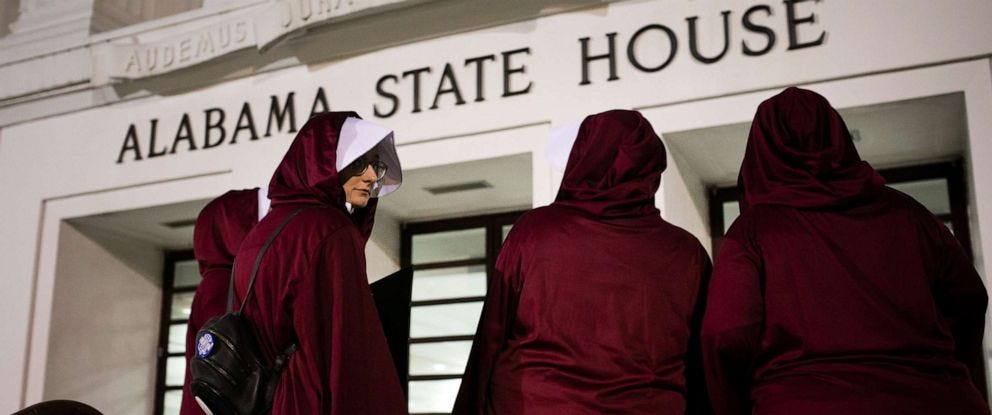Alabama Protects Rapists' Parental Rights at Any Cost

The recent increased abortion restrictions in Alabama are bringing attention to how the justice system in America is failing rape victims at every level. Not only do women have to struggle to gain access to abortion services in more and more US states, they are also being forced by these states to comply with archaic laws allowing their rapists parental rights, including court ordered visitation. You heard that correctly: women who are raped are being forced to continue a life long relationship with their rapist and co-parent children resulting from those rapes for the rest of their lives.
What’s been made perfectly clear is that the war on women is real and the center of the biggest battle so far is taking place in Alabama.
A 32 year-old woman in Birmingham, Alabama who is just going by the name “Jessica” to protect her children, has recently spoken out about her situation that she has been struggling with since the age of 12. She was repeatedly raped by her uncle, her mother's half-brother, for years and the abuse resulted in four pregnancies starting at the age of 14. The years of non-stop abuse resulted in three live births and one miscarriage. Her third child eventually died due to a disease common in cases of incest. Despite all of the evidence against him, including DNA evidence, living offspring and previous felony convictions, Jessica’s uncle was never brought to justice for raping her. Instead, she was forced by her family to marry her rapist, and the marriage was later annulled by a court due to a "familial relationship." But a conviction would have done nothing to stop her uncle from having access to Jessica through her children, because the state of Alabama refuses to terminate parental rights in cases where the children are born of rape.

No Statute Terminating Parental Rights for Rape or Incest
Alabama, along with Minnesota, is one of two states with no statute terminating parental rights for a person found to have produced a child by rape or incest. The recently passed ban in Alabama that denies access to abortion for victims of sexual assault and/or incest will also serve to increase the number of these cases where rapists are afforded parental rights. The inability to get an abortion will mean the increase of offspring generated by rape. More victims will be forced to bear children and co-parent with their assailants and more children will be exposed to parents who are rapists and/or possibly guilty of incest.
Alabama lawmakers considered a bill last month that would have terminated parental rights in cases involving rape, but that language was taken out to limit the law to cases in which people are accused of violating their own children, not in cases where one parent violates another parent. The language was seen as unfair because it only addressed those who could get pregnant and lawmakers felt this would disproportionately affect boys-the result is that women keep paying the cost.
Split on the “Clear and Convincing Evidence” Standard
Unlike Alabama and Minnesota, nearly half of US states require a rape conviction to actually terminate parental rights. After Congress passed the Rape Survivor Child Custody Act in 2015, many states adopted statutes that ended parental rights when “clear and convincing evidence” could be shown that a child was the result of rape. So unlike the heightened criminal standard of “beyond a reasonable doubt,” the evidence provided only needs to show that the rape in question is “highly and substantially more likely to be true than not. ” This standard is also used in situations involving child molestation accusations, neglect cases or parents accused of habitual drug use.
It also demands that victims, who are predominately female, overcome a higher standard of proof than the one used to protect children from the exact same perpetrators.
An example of this might be witness testimony that they overheard a victim say “no” or protest the sexual encounter. The standard requires less proof, which has prompted critics to argue that false rape claims could arise during contentious divorce proceedings involving child custody. These false allegation concerns formed the basis for the evolution of laws that currently exist in the other half of US states that will only terminate parental rights once the parent has formally be convicted of rape.
Termination of Parental Rights only After a Rape Conviction
Recently, Wyoming pulled the “clear and convincing evidence” standard from a bill that dealt with parental rights and used language that demanded a parent be convicted of the crime of rape before rights could be terminated. But given that less than 5% of criminal rape arrests will lead to a conviction and even fewer of those convicted will actually serve jail time, this standard is essentially dismissive to women. It also demands that victims, who are predominately female, overcome a higher standard of proof than the one used to protect children from the exact same perpetrators.

Abortion restrictions are rooted in an obvious bias against women. But, the subsequent lack of justice for rape victims after they birth their rapist’s offspring by demanding they be tied to them for life is especially sinister. It’s a cruel concept that promotes the perpetuated social norm that the desires of any man outweigh the rights of any woman. While women continue to suffer unequal protection under the law, forcing a woman to raise a child with her rapist, who may or may not be related to her is sick and the subsequent reflection of these laws on society will be to perpetuate sickness for generations to come. The potential harm to children being forced to be raised by sexual predators is too dangerous to overlook. Being a rapist does not make someone a father and accidental fathers who are rapists should not be defended in any circumstance. What’s been made perfectly clear is that the war on women is real and the center of the biggest battle so far is taking place in Alabama.
Amee Vanderpool writes the “Shero and a Scholar” Newsletter and is an attorney, contributor to Playboy Magazine, analyst for BBC radio and Director of The Inanna Project. She can be reached at avanderpool@gmail.com or follow her on Twitter @girlsreallyrule.



